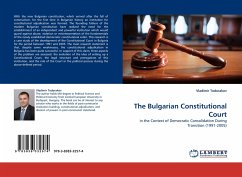With the new Bulgarian constitution, which arrived after the fall of communism, for the first time in Bulgarian history an institution for constitutional adjudication was formed. The founding fathers of the modern Bulgarian constitution have realized the need for the establishment of an independent and powerful institution which would guard against abuse, violation or misinterpretation of the fundamentals of the newly established democratic constitutional order. This research is a case study of the development of the Constitutional Court in Bulgaria for the period between 1991 and 2005. The main research statement is that, despite some weaknesses, the constitutional adjudication in Bulgaria has been quite successful. In support of this claim, three aspects of the problem are assessed: the evolution of the idea of setting up a Constitutional Court, the legal structure and prerogatives of this institution, and the role of the Court in the political process during the above-defined period.







